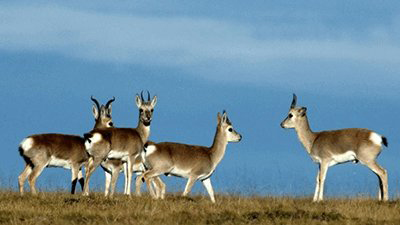Wildlife protection has long been a contentious issue in China, with animal rights groups criticizing existing laws for lacking sufficient protection for endangered species.
在中國,野生動物保護一直是個熱議問題,有動物權利保護組織對現有法案提出批評,稱缺少對瀕危物種的有效保護。
The current wildlife protection law was implemented in 1989, and it allows such practices as farming tigers and bears for traditional Chinese medicine and other commercial uses.
《野生動物保護法》的最新修訂要追述到1989年,該法案讓老虎養殖,活熊取膽以及其它商業用途鉆了空子。
But critics say the animals are kept captive in terrible conditions and argue that farming practice itself actually reduces wildlife population.
有批評人士指出,動物的“監禁”生活苦不堪言,并稱養殖本身就在減少野生動物數量。
Take the example of the bear-farming industry.
我們以“熊產業”為例。
According to Animals Asia, a Hong Kong-based charity, black bears that are farmed for bile, which is used to produce traditional Chinese medicine, suffer from poor living conditions.
據香港亞洲動物基金會表示,為制作中草藥材,飼養黑熊汲取膽汁,而黑熊的生存條件極其惡劣。
It also argues that it is cruel to extract bile from living bears because it causes immense distress.
并稱對于活熊取膽,黑熊將承受巨大痛苦。
What’s more, while the number of black bears in captivity has risen to 10,000 in recent years, the population of black bears in the wild, for instance in Changbai Mountains in the northeast fell by 93.4 percent from 1990 to 2010.
近些年,人工養殖黑熊數量已升到1萬頭,而從1990-2010年,東北長白山的野生黑熊數量下降93.4%。
Many animal protection experts interviewed by Caixin have also said the law has loopholes that create leeway for poaching and illegal trading of wildlife products, which has pushed many species to the verge of extinction over the past two decades.
許多接受財新采訪的動物保護專家指出,《野生動物保護法》存在許多漏洞,這為捕殺以及非法買賣野生產品開了綠燈,過去20年間,許多野生動物瀕臨滅絕。
Some changes to that law have been proposed and a draft has been open to public consultation between January 29 and February 5.
從1月29日-2月5日,新法案開始公開征求意見。
But conservationists denounced the revision, saying that instead of offering protection for endangered animals in China, it has gone the very opposite direction.
但有保護人士對修正案進行譴責,稱此法案并沒有達到保護野生動物的作用,而恰好背道而馳。
They say the new draft will merely regulate and even provide further legal backing for the continued utilization of wildlife for commercial purposes, instead of banning the practice.
新法案僅僅進行了規定,甚至對商業用途提供了后續法律支持,而不是令行禁止。

Of course, those involved in the drafting process have pointed out the revision represents at least some progress. For instance the draft proposes to illegalize cruelty on animals for the first time.
一些專業人士指出,這份草案也有一些亮點。明確規定不得虐待野生動物。
But critics say the wording is too vague to be useful and denounce other aspects such as the clause that allows animals to be used for exhibitions and performances.
但有批評人士指出,新法案用詞模糊,并對允許動物表演進行了譴責。
Indeed, organizations such as China Biodiversity Conservation and Green Development Foundation and Friends of Nature have saddled up to organize online campaigns to push legislators to alter the amendments.
“中國生物多樣性保護”“綠色發展基金會”“自然之友”等組織發起網上動員,呼吁立法人員對修訂草案進行修改。
But, they may face an uphill battle.
這也是一場硬仗。
For one, China has had a long tradition of using wild animals for food and medicine, which has led to the formation of an entire business chain that depends on the notion of using wild animals and plants as commercial means, said Zhou Ke, a law professor at Renmin University.
據人民大學法律學教授周克表示,將動物用作藥材和烹飪的傳統早已有之,動植物商用的巨大產業鏈也隨之形成,
He said this attitude must be changed before the wildlife can really be protected.
他認為要讓野生動物真正得到保護,我們的態度必須發生轉變。
譯文屬可可英語原創,未經允許,不得轉載。











